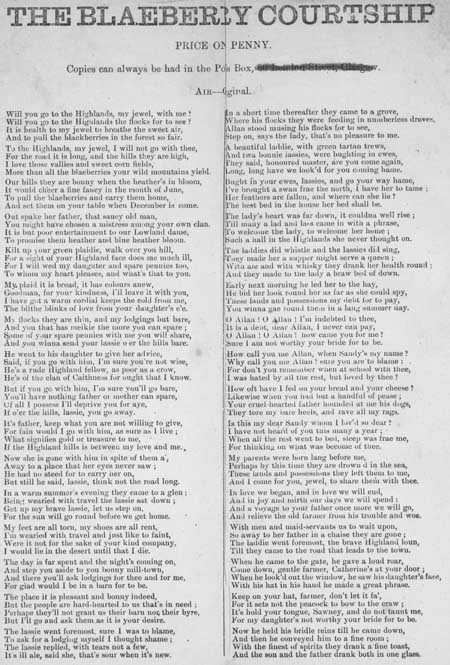Commentary
This ballad begins: 'Will you go to the Highlands, my jewel, with me? / Will you go to the Highlands the flocks for to see? / It is health to my jewel to breathe the sweet air, / And to pull the blackberries in the forest so fair.' A note below the title states that this ballad was to be sung to an original tune. Sold for a penny, a further note below the title states that 'Copies can always be had in the Pos [Poet's] Box, 80 London Street, Glasgow'. This ballad celebrates the central Romantic concept of young lovers being in tune with nature and each other. The ballad tells the story of a young man from the Highlands who having fallen in love with a young woman who lives in the Lowlands, asks her to go and live with him in the Highlands. At this time, however, there existed a strong element of mistrust between the people of these two regions. Thus, the girl's father states that he will not allow his daughter to travel with her lover to the Highlands. Happily, however, love triumphs over all obstacles, and the young man and the father are eventually reconciled - thus opening the door for a symbolic marriage between Highlands and Lowlands.
The Poet?s Box in Glasgow operated from 1849 to 1911. Matthew Leitch was the proprietor at 6 St. Andrew Lane?s, a narrow street on the south side of Gallowgate, from 1850 to 1858. His son William Munsie Leitch worked at the same address from 1859 to 1865 and at varous addresses in London Street until 1911. Many of the broadsides published by the Glasgow Poet?s Box were dated and some carried advertisements, not just for printed items but also for shoe blacking and ?soap for lovers?! Like the other ?boxes? in Dundee and Edinburgh, the Glasgow one sold love songs, sea shanties, parodies and dialogues. It is not clear what the connection between the different Poet?s Boxes were. They almost certainly sold each other?s sheets. It is known that John Sanderson in Edinburgh often wrote to the Leitches in Glasgow for songs and that later his brother Charles obtained copies of songs from the Dundee Poet?s Box. There was also a Poet?s Box in Belfast from 1846 to 1856 at the address of the printer James Moore, and one in Paisley in the early 1850s owned by William Anderson.
Early ballads were dramatic or humorous narrative songs derived from folk culture that predated printing. Originally perpetuated by word of mouth, many ballads survive because they were recorded on broadsides. Musical notation was rarely printed, as tunes were usually established favourites. The term 'ballad' eventually applied more broadly to any kind of topical or popular verse.
View Transcription | Download PDF Facsimile
|
 |
Probable period of publication:
1870-1890 shelfmark: RB.m.143(004)
 View larger image
View larger image
|


